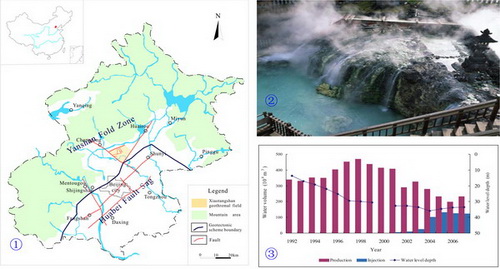Ph.D. student DUAN Zhongfeng and his teacher PANG Zhonghe investigate the limestone geothermal reservoirs in Beijing and Tianjin.
They demonstrate how sustainability can be quantitatively evaluated, and highlight the essential differences between sustainable and non-sustainable development schemes. After examining the complex nature of sustainability evaluation, fuzzy synthetic evaluation is applied as a tool for the quantitative sustainability rating of geothermal reservoirs. The evaluation procedures include systemic criteria selection, weighing, individual criterion evaluation and finally final multi-criterion decision analysis evaluation. The sustainability of a limestone reservoir in the urban sector of Tianjin is rated rather low because of insufficient levels of water injection. On the contrary, the carbonate rock reservoirs of the Xiaotangshan geothermal field in suburban Beijing have a strong sustainability rating, mainly due to high injection rates.
Duan et al. Sustainability evaluation of limestone geothermal reservoirs with extended production histories in Beijing and Tianjin, China. Geothermics, 2011, 40: 125-135 (Download Here)

Fig.Location of the Xiaotangshan geothermal field and exploitation history for the Xiaotangshan geothermal field in Beijing. (Image by DUAN)